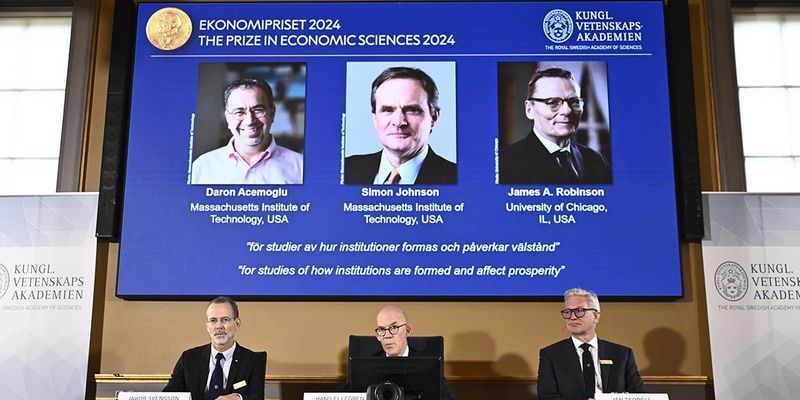The Nobel Memorial Prize in Economic Sciences was awarded to Daron Acemoglu, Simon Johnson, and James Robinson for their revolutionary research on the relationship between institutions and economic inequality. Their theory offers a fresh perspective on a question that has puzzled economists and historians for decades: Why are some nations rich while others struggle with poverty?
The Big Idea: Institutions, Not Geography, Drive Prosperity
For many years, theories about wealth inequality pointed to factors like geography, culture, or even natural resources. Acemoglu, Johnson, and Robinson, however, shift the focus to institutions—the man-made political and economic systems that govern how societies function. Their research shows that the quality of institutions—how inclusive or extractive they are—determines whether a nation prospers or worsens in poverty.
Their findings challenge long-held assumptions. For instance, it’s often assumed that nations with access to natural resources will naturally flourish. But the trio’s research demonstrates that without inclusive institutions—which allow more people to participate in the economy—countries may fall into the trap of resource dependence, ultimately exacerbating inequality.
Inclusive vs. Extractive Institutions
Institutions refer to the formal and informal rules, norms, and systems that govern a society’s political and economic interactions. These include laws, regulations, government systems, property rights, and social norms that shape how power and resources are distributed and how individuals and groups participate in the economy. The core of their theory lies in differentiating between two types of institutions:
- Inclusive institutions: These institutions promote broad participation in economic activities, enforce property rights, and provide opportunities for individuals to improve their socioeconomic standing. Countries with inclusive institutions—like the United States or South Korea—tend to have thriving economies with higher living standards.
- Extractive institutions: In contrast, extractive institutions concentrate power and wealth in the hands of a few. These institutions limit the majority’s access to opportunities, creating significant wealth disparities and stifling economic growth. Examples of extractive institutions can be seen in countries with authoritarian regimes, where political and economic systems are designed to benefit the ruling class at the expense of the population.
Historical Examples: Why Nations Fail
In their influential book, Why Nations Fail, Acemoglu and Robinson highlight examples of countries that illustrate their theory. Take North and South Korea: both nations share the same geography and cultural history, yet their economic outcomes are vastly different. Why? North Korea is governed by extractive institutions, while South Korea has developed inclusive institutions that allow its citizens to participate in the economy and innovate.
Another example is colonialism in Africa and Latin America, where extractive institutions were established by European powers to exploit local resources. These institutions often persisted after independence, contributing to ongoing poverty and inequality.
How Technology Plays a Role
Their recent work, Power and Progress, tackles a critical issue of our time: technology. They argue that technological advances don’t automatically lead to shared prosperity. In fact, if left unchecked, technology can heighten inequality, as wealth from innovations tends to concentrate in the hands of a few unless inclusive institutions ensure broader access to these gains.
Why This Matters Today
As we move further into the 21st century, Acemoglu, Johnson, and Robinson’s theory is more relevant than ever. Global inequality is rising, with wealth increasingly concentrated in a small elite. Understanding how institutions shape prosperity provides a roadmap for policymakers. If countries focus on reforming institutions to make them more inclusive, they can unlock their full economic potential and reduce inequality.
This research also sheds light on issues like the automation revolution, climate change, and the post-COVID recovery. Ensuring that the benefits of new technologies and global policies are shared broadly will require inclusive political and economic institutions.
What the Nobel Prize in Economics Signifies
Winning the Nobel Prize in Economics is more than just a nod to impressive research. It signals that this work has the power to shape the future of policy and economics. The prize is awarded to those whose contributions help humanity better understand economic systems—and in this case, it brings forward a deeper understanding of how institutions affect wealth distribution.
This theory has already influenced, how many governments and international organisations approach economic development. The message is clear: strong, inclusive institutions are the key to creating wealth that benefits everyone, not just a privileged few.
So, why are some countries so rich? It’s not about where you are or what resources you have; it’s about how you govern. In the quest for prosperity, nations must build institutions that allow for broad participation, innovation, and growth. The Nobel-winning research by Acemoglu, Johnson, and Robinson is a wake-up call: the key to reducing inequality and creating a more prosperous world lies in transforming our institutions.




![Read more about the article [Funding alert] SaaS startup Murf.ai raises $1.5M in seed round led by Elevation Capital](https://blog.digitalsevaa.com/wp-content/uploads/2021/07/c3706fc8aa882dc65eefe8c6d6d80bf6dc392b8e6cfe32bbe565d4904f58fd4e-1625550884415-300x150.jpg)





